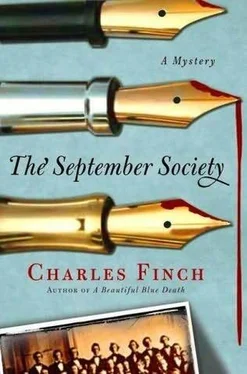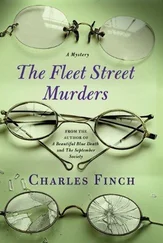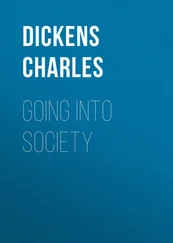Charles Finch - The September Society
Здесь есть возможность читать онлайн «Charles Finch - The September Society» весь текст электронной книги совершенно бесплатно (целиком полную версию без сокращений). В некоторых случаях можно слушать аудио, скачать через торрент в формате fb2 и присутствует краткое содержание. Жанр: Исторический детектив, на английском языке. Описание произведения, (предисловие) а так же отзывы посетителей доступны на портале библиотеки ЛибКат.
- Название:The September Society
- Автор:
- Жанр:
- Год:неизвестен
- ISBN:нет данных
- Рейтинг книги:4 / 5. Голосов: 1
-
Избранное:Добавить в избранное
- Отзывы:
-
Ваша оценка:
- 80
- 1
- 2
- 3
- 4
- 5
The September Society: краткое содержание, описание и аннотация
Предлагаем к чтению аннотацию, описание, краткое содержание или предисловие (зависит от того, что написал сам автор книги «The September Society»). Если вы не нашли необходимую информацию о книге — напишите в комментариях, мы постараемся отыскать её.
The September Society — читать онлайн бесплатно полную книгу (весь текст) целиком
Ниже представлен текст книги, разбитый по страницам. Система сохранения места последней прочитанной страницы, позволяет с удобством читать онлайн бесплатно книгу «The September Society», без необходимости каждый раз заново искать на чём Вы остановились. Поставьте закладку, и сможете в любой момент перейти на страницу, на которой закончили чтение.
Интервал:
Закладка:
This gave Lenox three names to research and a building to focus on. He also knew that someone in his web of friends would belong to the Biblius, an elite and prideful sort of club which accepted members regardless of background who had exceptionally fine collections of incunabula. Lady Jane would know it. Her family had a famous library of early books.
Swallowing the thought of his old friend, Lenox picked up the papers that Mr. Folsom had just brought. On top of the pile was an unpublished collection called Seals, Crests, and Coats of Arms of Some British Organizations, Being an Attempt to Classify Their Genealogies and Histories. It was by somebody named H. Probisher Protherham whom Lenox thanked his lucky stars he didn’t know. A man who could write a treatise on crests was a man capable of anything, was Lenox’s feeling. Give him open rein at a dinner party and there was no level of tediousness he might not achieve.
He languidly flipped to the S section of the papers and perked up a bit when he saw that the seal of the September Society had been included. It was a rather ornate thing. Below it H. Probisher Protherham had written: The September Society. Design: Butler. Approved 1849. Argent, a wildcat over ermine chevron, passant Sable. Motto: Nil Conscire Sibi. “Of Clear Conscience.”
Lenox sat back in his chair, thinking. Could it be? He read it over again and then copied the entire entry down in his notebook, also marking down the shelf number and the book’s title and author. He glanced through the index to make sure there was only one reference to the September Society and then read the description over one more time for good measure.
So, he thought. Another cat.
CHAPTER TWENTY
H ow do you do, Mr. Kelly?”
“Quite well, thank you, Mr. Lenox, but as I said before, please call me Red.”
“That’s right, the students call you that, don’t they?”
“They do, sir, though not because of this.” With a laugh, the head porter tugged at his shock of black hair. “Because I’m Irish, you see.”
“I remember we used to give our head porter a bit of chaff in my day, too. Sign of affection, I expect.”
“I hope so, sir. Was there anything I could help you with?”
“As a matter of fact there is, Red. I was hoping to talk to you about the day Bill Dabney and George Payson disappeared.”
“I can’t, sir, not after poor Payson’s body showed up in the middle of Christ Church Meadow. Dreadful, dreadful blow, that.”
“In that case I have a note here from Inspector Goodson asking you to answer my questions.”
Kelly looked over the note Lenox had handed him and then nodded. “Fair enough,” he said, “though I don’t reckon I’ll be much help.”
“Why is that?”
“I didn’t see much of Master Payson that day, sir.”
“But you saw his mother.”
“Aye, at a little before midday.”
“Were you accustomed to seeing her?”
“Certainly, sir.”
“She visited quite often, then?”
“Aye, sir.”
“And did you see the meeting between George Payson and his mother out here in the Front Quad, by any chance?”
“Can’t say I did, sir, no.”
“When was the last time you saw George Payson?”
“I did see him when he came out, sir, after he saw his mother and promised to meet her.”
“Ah!”
“He didn’t look at me, though. And that was the last time.”
“He followed his mother out?”
“She went out down Ship Street, sir, and then he went out five minutes later.”
Ship Street (once known as Lincoln College Lane) and Turl Street formed a tiny cross at the center of Oxford, and a great deal of colleges were clustered around them. At the end of Ship was the Saxon Tower, the oldest structure in Oxford, which dated to 1040.
“Did you see Bill Dabney that day, Mr. Kelly? Red?”
“I didn’t, sir. I had seen him the night before.”
“What was he doing?”
“Going to the dance at Jesus College.”
“Did George Payson go to the same dance?”
“I don’t know, sir.”
Lenox thought of the dance card he had found in Payson’s room. “How about Payson’s scout?”
“He didn’t go to the dance, no, sir.”
Lenox laughed. “Very good. I meant-did you see the scout that day?”
“I see him every day, sir.” The head porter seemed to be growing impatient.
“Could I meet him?”
“He’s not here, sir.”
“That’s odd.”
“Not really, sir, begging your pardon. It’s his day off.”
“Do you know whether the police have spoken to him?”
“They haven’t to my knowledge, Mr. Lenox.”
Lenox puzzled over this. Suddenly the dance card seemed like another clue for his list. The strange thing about the card was that only one side of the correspondence appeared on it-the porter’s response. Had Payson sent his request down on a different piece of paper? But why would he have done that?
“Have you heard of the September Society, Mr. Kelly?”
“No, sir.”
“I believe you were in the military, however?”
“Yes, we were, all of us porters. The Royal Pioneer Corps.”
“Did you see the battlefield?”
“No, sir, thankfully not. Though mind, I would have done my bit when the time came.”
“Of course… what can you tell me about Bill Dabney?”
The head porter shook his head apologetically. “We have an awful lot of students, sir, and the only ones I know well are our third-years. Master Dabney was only another face in the long procession. Friendly enough, good pals with Masters Payson and Stamp-I fear that’s about the extent of my knowledge of him, sir.”
“Did he get much post?”
“Post? I couldn’t say, sir.”
“And Payson?”
“Oh-now that you mention it, he’d been getting more recently.”
“Do you have any memory of it?”
“One queer thing comes back, sir, now that you say it. He had been getting letters, properly stamped, Queen’s head on ’em, and then throwing ’em away unopened.”
“Why did you notice that?”
“I didn’t, sir-Mr. Fallows, another of our porters here, he noticed it, Mr. Lenox.”
“Can you remember when?”
“Certainly, sir. About a week ago, I reckon-and finally Mr. Fallows went and took the letter out of the wastepaper basket to open it, and he found it to be empty!”
“Puzzling, that.”
“It is, quite.”
“Anything on the letter except the stamp and address? Any markings?”
“Nothing, sir. No return of address.”
A signal? How long had Payson known that he was in danger?
“You don’t have any mail for George Payson left, do you?”
“None, sir, nor for Master Dabney. Checked straight away, I did.”
“Which other porters were on duty the day Dabney and Payson vanished?”
“I was, sir, both days, Fallows on evenings, and with me in the daytime was a chap named Phelps.”
“You’re alone now?”
“No, Phelps is out checking the staircases and the student rooms. A new system since the unfortunate incident.”
“Ah. Well, thank you, Mr. Kelly. I appreciate it.”
Lenox left Lincoln and walked the short distance across Turl Street to Jesus College, another of the small to medium-sized colleges along this central artery, not quite as grand as some but beautiful in their own right. Jesus was known for having a large Welsh population (a Welshman had founded it, though officially Elizabeth I held the title of Founder) and for its frequent contributions to the ’varsity athletic clubs. The college also famously owned a huge silver punch bowl from which the Tsar of Russia, the Duke of Wellington, the King of Prussia, and the Prince Regent had formally drunk to signify their defeat of Napoleon in 1814. But Lenox’s favorite thing about it was the daffodils that appeared in full bloom on (the Welsh) St. David’s Day, the first of March, to signify the beginning of spring. He remembered fondly seeing the daffodils and feeling his heart rise as another cold winter vanished behind him.
Читать дальшеИнтервал:
Закладка:
Похожие книги на «The September Society»
Представляем Вашему вниманию похожие книги на «The September Society» списком для выбора. Мы отобрали схожую по названию и смыслу литературу в надежде предоставить читателям больше вариантов отыскать новые, интересные, ещё непрочитанные произведения.
Обсуждение, отзывы о книге «The September Society» и просто собственные мнения читателей. Оставьте ваши комментарии, напишите, что Вы думаете о произведении, его смысле или главных героях. Укажите что конкретно понравилось, а что нет, и почему Вы так считаете.












